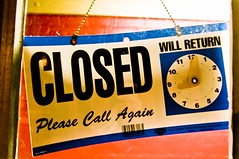(cc) photo by khawkins04
Last week's post How To Get Paid For No Shows prompted some excellent discussions and follow up questions about how to enforce cancellation and payment policies. One comment in particular, posted by "Paul" brought up a valid concern.
Do your policies go both ways? How do you handle the situation when you, the therapist, no show for a session due to a scheduling error, inadvertently double book a session, or cancel a session at the last minute due to illness? Here's what he wrote:
What happens if the therapist needs to cancel a therapy session with less than 24 hours notice to the client?
This isn’t a sarcastic question. My dentist has a policy similar to yours and I don’t really have a problem with it in general. However, one day I needed to rearrange my work schedule to accommodate an appointment with the dentist. The morning of the appointment I received a call stating that the dentist was sick and wouldn’t be available for my appointment. Ok, no problem, these things happen. They were able to reschedule me quickly, too.
A few months later the reverse happened – I had something very important and completely unavoidable come up and I had to cancel the morning of a scheduled afternoon appointment. To their credit, they acknowledged that I’ve been a client for several years and had never missed an appointment or had to cancel without 24 hours notice prior to this incident. They didn’t charge me and all was good.
What’s annoying is that not all offices practice this. Some are all too willing to charge a client who no-shows or calls to cancel with less than 24 hours notice, but when they need to cancel with less than 24 hours notice they act as if it’s no big deal and the client is expected to simply shrug it off.
If we, as therapists, expect clients to follow through with their session or pay for the missed session, shouldn't we offer them the same courtesy and model the accountability that we are requiring of them?
When the therapist no-shows
If I miss an appointment due to a scheduling error on my end, I offer the client a free session. If I am running more than 15 minutes late to a session I generally offer the session for free as well.
When the client or therapist is sick
To clarify, I don’t charge for no-shows when there is an illness or an emergency on the client's end. If I am ill I don't offer a free session unless I was unable to reach the client and then showed up for the scheduled appointment. However, I do watch closely for patterns in client behavior. If they are sick every other week, then I treat it as a relationship pattern and deal with it as a clinical issue in therapy sessions.
How do you handle the situation when you, the therapist, no show, double book, or have to cancel at the last minute due to illness or accident?




As healers, we genuinely like to do our work. Guiding clients through the therapy process and seeing them make progress is why we do what we do. But if you're in private practice, you know there's a lot going on in the back end and that it's crucial to run an efficient and organized business.